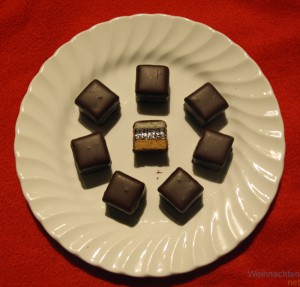About a week ago, I spotted all these Nikoläuse (plural for Nikolaus) in our local supermarket.
Either the Nikolaus’s early appearance had lapsed into oblivion over the years, or sales are getting more aggressive. It’s probably a combination of both.

Nikolaus at the German supermarket
These Stiefelgeschenke (stocking fillers) are meant for the morning of December 6, when Nikolaus comes around, and rewards the good children by stuffing goodies into their boots left outside the home.
Even though Nikolaus might resemble Santa, they are two different traditions . Nikolaus was a Greek bishop (4th century) and Santa, well, he is from the Northpole.
I do miss the 60s for our innocence. We children did not expect anything and there was nothing whatsoever, resembling Nikolaus (Dec 6) or Christkind (Dec 24), in any village grocery store. Our parents left us behind with an aunt, when they did their Christmas shopping in the nearby town.
I have to admit I had my first taste of Lebkuchen and Zimtsterne (traditional Christmas cookies). The other day though, I refused a cup of hot Glühwein (mulled wine), as I don’t want to have it too early, because I might get tired of it even before the Christmarket season begins.
At Allthingsgerman, you can read more on Der Niklaustag.


 The word Dominostein is used to describe a small baked sweet that is eaten at Christmas time in Germany. It is made up of two or three layers, the base being
The word Dominostein is used to describe a small baked sweet that is eaten at Christmas time in Germany. It is made up of two or three layers, the base being 
 Lebkuchen is a type of cake associated with Christmas. It is baked using honey and a number of spices and is known throughout Germany by a variety of names such as Pfefferkuchen and Magenbrot.
Lebkuchen is a type of cake associated with Christmas. It is baked using honey and a number of spices and is known throughout Germany by a variety of names such as Pfefferkuchen and Magenbrot.


